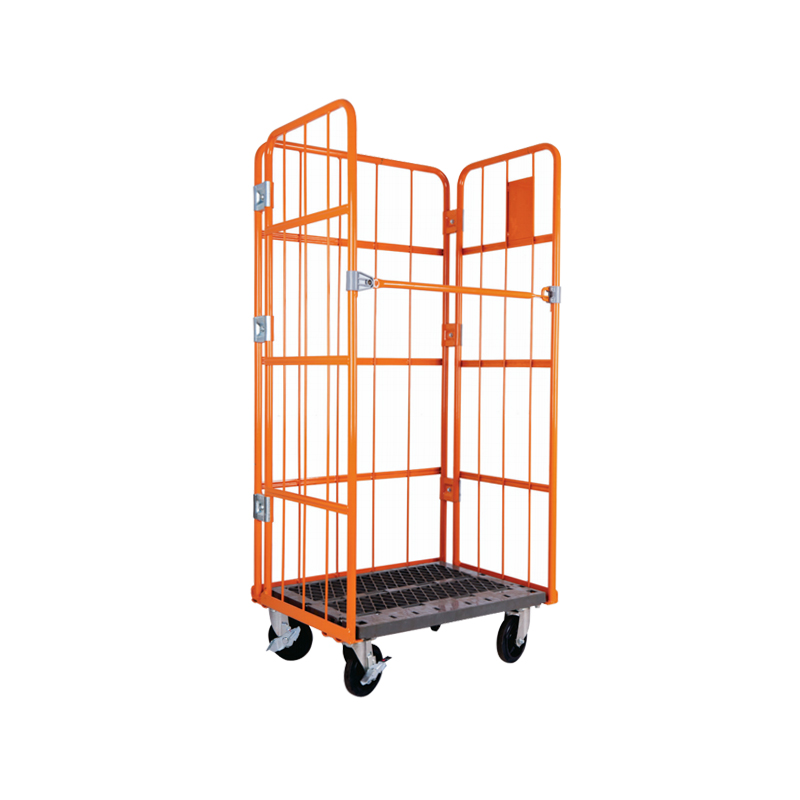Modular design in roll cage trolleys offers several advantages and potential drawbacks. Here’s a detailed analysis:
Advantages
1. Customization and Flexibility
Adaptability: Modular design allows for easy adaptation to different operational needs. Components can be added or removed to fit specific tasks or load requirements.
Versatility: Trolleys can be reconfigured for different uses without the need for entirely new units, making them highly versatile for various industries, from retail to logistics.
2. Cost-Effectiveness
Reduced Replacement Costs: If a part of the trolley is damaged, only the affected module needs to be replaced rather than the entire trolley.
Economies of Scale: Modular components can be mass-produced, reducing manufacturing costs and the cost per unit.
3. Ease of Maintenance and Repair
Simplified Maintenance: Individual modules can be easily removed and repaired or replaced, reducing downtime and maintenance costs.
Accessibility: Components are designed for quick access, making it easier to perform inspections and maintenance tasks.
4. Scalability
Incremental Upgrades: Businesses can start with a basic setup and gradually add more modules as their needs grow, making it easier to scale operations without large initial investments.
Future-Proofing: The ability to upgrade or modify the trolley with new modules means the system can evolve with changing requirements or advancements in technology.
5. Improved Storage and Transportation
Compact Storage: Modular trolleys can often be disassembled or folded, making them easier to store when not in use.
Efficient Shipping: They can be shipped in a more compact form and assembled on-site, reducing transportation costs.
6. Enhanced Ergonomics and Safety
Customizable Ergonomics: Modules can be designed to meet specific ergonomic requirements, reducing the risk of injury and improving worker comfort.
Safety Features: Safety modules such as brakes or protective barriers can be easily integrated into the design.

Potential Drawbacks
1. Initial Cost and Investment
Higher Initial Cost: The initial purchase of modular systems may be higher compared to non-modular counterparts due to the complexity of the design and the need for compatible components.
Investment in Training: Employees may require training to understand how to assemble, disassemble, and reconfigure the trolleys properly.
2. Complexity of Design and Assembly
Design Complexity: Modular systems can be more complex to design and engineer, potentially leading to longer development times and higher design costs.
Assembly Time: Assembling modular trolleys can be time-consuming, especially if the system is complex or if the staff is not adequately trained.
3. Compatibility Issues
Interchangeability Concerns: Modules from different manufacturers may not be compatible, leading to potential issues in sourcing and integrating new parts.
Standardization Challenges: Ensuring that modules adhere to industry standards can be difficult, limiting the interoperability of components from different suppliers.
4. Potential for Increased Weight
Added Weight: The use of multiple components and connections might lead to increased weight compared to a monolithic design, which can impact maneuverability and energy efficiency.
Load Distribution: Ensuring that the modular design maintains proper load distribution can be challenging, which might affect the trolley's stability.
5. Maintenance and Replacement Logistics
Parts Inventory Management: Maintaining an inventory of different modular components can be complex and may require additional space and resources.
Supply Chain Dependencies: Relying on specific modules from particular suppliers may lead to delays if those components are not readily available.
6. Potential for Wear and Tear
Increased Wear at Joints: Modules connected via joints or fittings may experience higher wear and tear at these points, potentially leading to more frequent maintenance.
Component Fatigue: Regular disassembly and reassembly might cause faster fatigue in certain components, reducing their lifespan.
Modular design for roll cage trolleys offers significant benefits in terms of flexibility, cost-effectiveness, and scalability. However, it also comes with challenges such as higher initial costs, complexity in design and maintenance, and potential compatibility issues. Businesses need to weigh these factors based on their specific needs and operational context to determine if a modular approach is the best fit for their roll cage trolley requirements.
